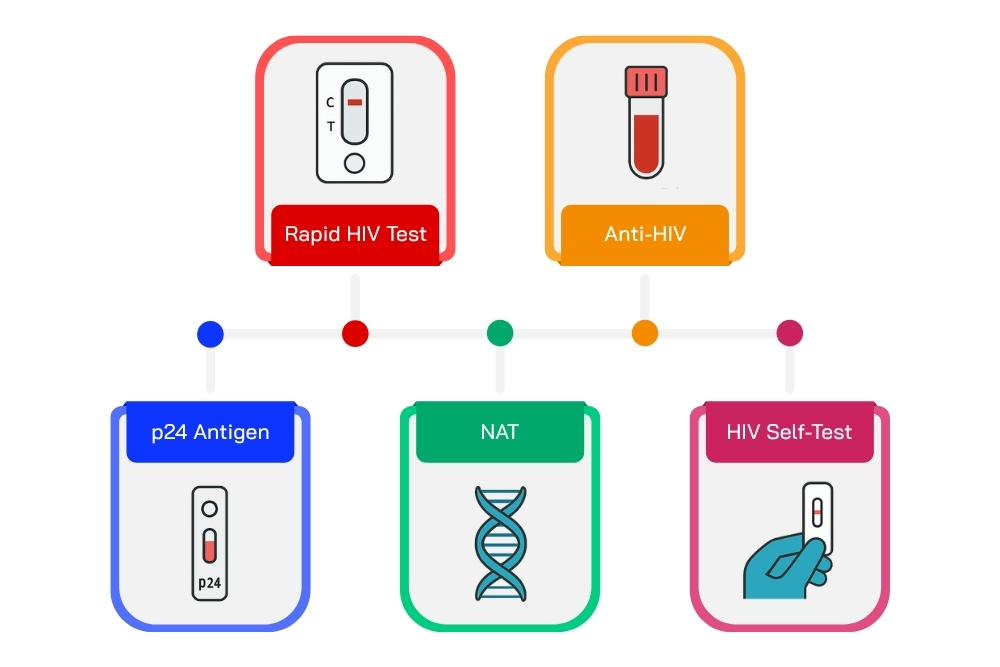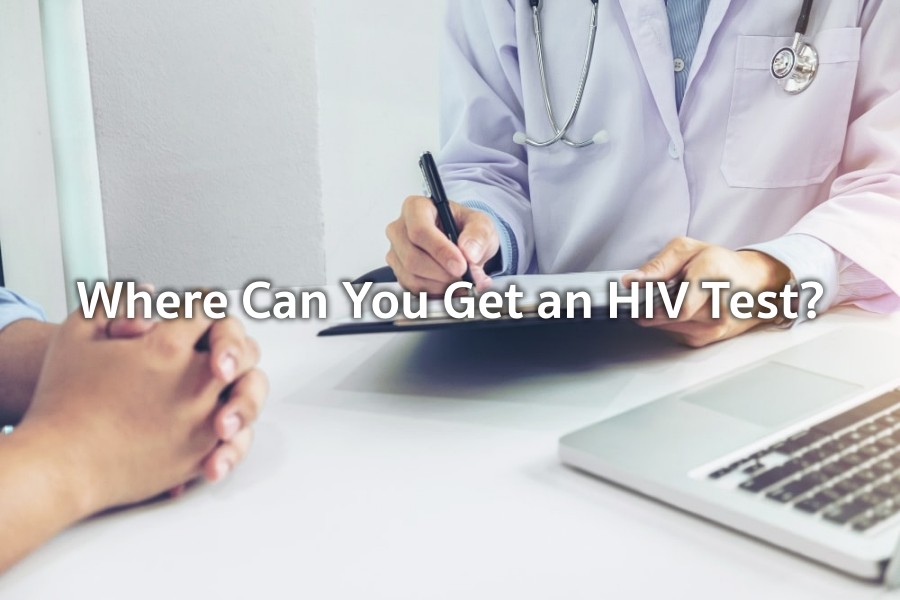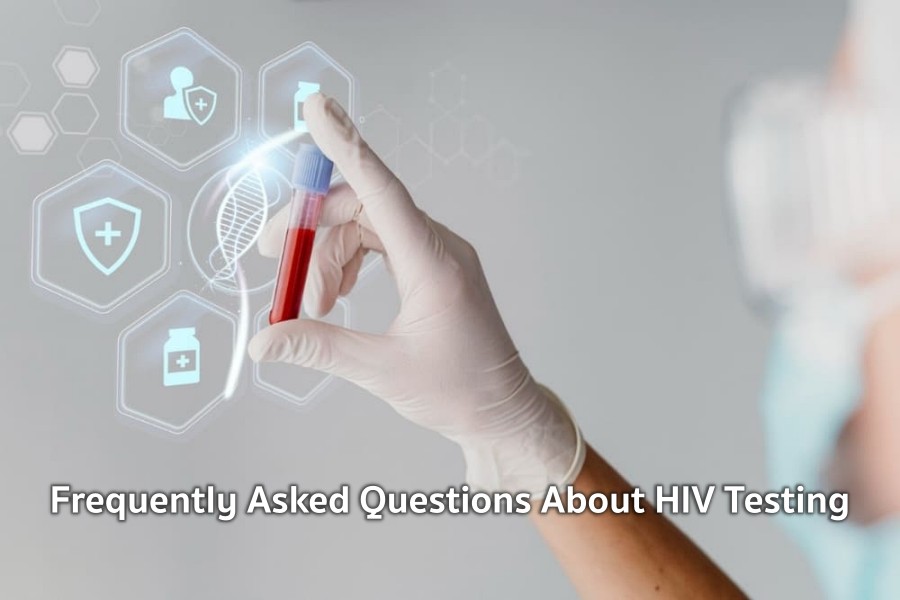HIV Check-up is one of the most essential steps in taking comprehensive care of your sexual health. In the past, many people hesitated to get tested due to fears of complicated procedures or life-changing results. But today, HIV testing is fast, safe, and more private than ever. Results can be available within minutes, making the process more accessible and less intimidating.
Getting tested is no longer difficult—starting today is easier than you think. Knowing your HIV status not only empowers you to make informed health decisions but also plays a vital role in timely prevention and treatment. If you’ve been at risk, early testing can help prevent the spread of the virus and is a responsible action for both yourself and those you care about.
This article will walk you through the entire HIV screening process—from the types of tests available in Thailand, how to prepare, understanding your results, to how to take care of yourself after receiving your test outcome. Our goal is to provide accurate, accessible information so you can confidently take charge of your health and choose to get tested.
List of Contents
- What Is HIV Check-up & Why Is It Important?
- What Are the Current HIV Testing Methods?
- When Is the Best Time to Get an HIV Test?
- How to Prepare for an HIV Testing
- Types of HIV Testing Results
- Where Can You Get an HIV Test?
- Benefits of HIV Testing
- How Much Does an HIV Test Cost?
- Frequently Asked Questions
What Is HIV Check-up & Why Is It Important?
HIV Check-up is a medical process used to detect the presence of the human immunodeficiency virus (HIV) in the body. HIV attacks the immune system, and without treatment, it can progress to AIDS (Acquired Immunodeficiency Syndrome) over time. Getting tested is a crucial first step in understanding your health status and starting appropriate prevention or treatment.
“The importance of HIV screening is not limited to high-risk groups. It also applies to the general public—anyone who has ever had unprotected sex or engaged in behaviors that may have unknowingly exposed them to the virus. This is because HIV can live in the body for many years without showing symptoms. Early testing allows for timely intervention and appropriate health care.”
Moreover, HIV testing plays a vital role in preventing the spread of the virus in society. If HIV is detected early and antiretroviral therapy (ART) is started promptly and taken consistently, the virus can become undetectable in the bloodstream. This condition, known as “Undetectable = Untransmittable” (U=U), means the person cannot transmit HIV to others through sexual contact.
Getting tested and starting treatment early is not only a way to protect your own health—it is also a powerful tool in reducing new HIV infections and building a healthier society for all.
What Are the Current HIV Check-up Methods?
Today, there are several types of HIV testing methods available, each designed to suit different needs and situations. These methods vary in terms of speed, accuracy, and the technology used. The most suitable test for an individual often depends on factors such as the time since potential exposure, the testing location, and personal preferences.
Choosing the right screening method is essential to ensure the most accurate results. With the correct information, individuals can make informed decisions and take confident steps toward managing their health and preventing HIV transmission.

1. Rapid HIV Test
This is currently the most popular testing method. It uses either a finger-prick blood sample or oral fluid, and delivers results within 15–20 minutes. It is ideal for initial screening in clinics or mobile outreach services. The accuracy is quite high, especially if the test is done after the window period. If the result is reactive, a confirmatory test using standard laboratory methods is required.
2. Anti-HIV
This test detects antibodies (Anti-HIV) produced by the body after HIV infection, which usually become detectable 3–4 weeks after exposure. It has long been used as a standard testing method, including earlier ELISA or EIA techniques. While it is less effective at detecting early infection, it provides high accuracy when performed after the appropriate time frame.
3. p24 Antigen Test
This test focuses on detecting the p24 protein, a component of the HIV virus, which can be found as early as 2–3 weeks after infection—before the body starts producing antibodies. The p24 antigen test is commonly included in 4th generation HIV tests, which detect both p24 antigen and HIV antibodies in a single test. This increases the chances of detecting HIV in its early stages.
4. NAT or PCR Test
Nucleic Acid Testing (NAT) or Polymerase Chain Reaction (PCR) directly detects the virus’s genetic material (RNA or DNA), making it the earliest possible method for identifying HIV infection. It can sometimes detect the virus just 7–10 days after exposure. This test is often used in high-risk cases, such as individuals starting PEP or when other test results are inconclusive. While highly accurate, NAT/PCR tests are more expensive and usually offered only in hospitals or specialized laboratories.
5. HIV Self-Testing
This is a newer option officially approved by Thailand’s FDA. Self-test kits can be purchased from pharmacies or reliable online sources. Most tests detect antibodies using either a finger-prick blood sample or oral fluid. Users can perform the test at home and receive results in just a few minutes. If the result is reactive, it is essential to follow up with a confirmatory test by a healthcare professional. The key advantages of self-screening are convenience, privacy, and accessibility—especially for those who are hesitant to visit a clinic.
When Is the Best Time to Get an HIV Test?
Getting tested for HIV is one of the most effective ways to clearly understand your sexual health status. However, the timing of the test is just as important as the test itself. Testing too early can result in a false-negative outcome, meaning the virus is present but undetectable because the body has not yet produced enough detectable markers. This period is known as the Window Period
The ideal time to get tested depends on the type of HIV test used:
- Rapid Test and Anti-HIV Antibody Test: These tests are most accurate when taken at least 3 weeks (21 days) after a potential exposure. This allows time for the body to produce enough antibodies to be detected. For even greater accuracy, testing is recommended between 4–6 weeks after the risk event.
- p24 Antigen Test (4th Generation Test): This method can detect infection earlier and is suitable for testing as soon as 2 weeks (14 days) after exposure. Its accuracy improves significantly after 28 days.
- NAT/PCR Test: These tests detect the virus’s genetic material directly and are the earliest method available. They can be used as soon as 7–10 days after a high-risk incident, especially for individuals who are starting PEP or have had significant exposure.
If your first test is done during the window period, it’s recommended to get retested at a later time—such as one month or three months after the exposure—to confirm your result.
How to Prepare for an HIV Check-up
Getting tested for HIV doesn’t have to be scary—especially when you’re well prepared both physically and mentally. Preparing ahead of time can help the process go smoothly and make it easier to understand your results with confidence. This is especially important if it’s your first time getting tested. Here’s what you should know and how to get ready:
- Know the Date of Your Most Recent Risk Exposure
- Be aware of when you were last at risk—for example, when you last had unprotected sex. This helps healthcare providers assess which testing method is suitable for you and whether it’s the right time to get tested or if you should wait until after the window period for accurate results.
- No Need to Fast Before the Test
- You don’t need to fast or avoid food and water before an HIV test. You can eat and drink as usual. However, it’s recommended to avoid caffeine and alcohol before testing. If you’re being tested for other conditions at the same time, check with the clinic for any additional requirements.
- Stay Calm and Open-Minded
- It’s normal to feel nervous, but knowing your HIV status allows you to take control of your health and future. No matter the outcome, remember that HIV is manageable with treatment, and support is always available to help you through the process.
- Choose a Reliable Testing Facility
- Make sure to get tested at a certified and trusted health facility such as a hospital, specialized clinic, or recognized testing center. This ensures accurate results and access to professional care and counseling if needed.
Types of HIV Check-up Results
Understanding your HIV test result is essential—no matter which testing method you used. It’s important not to panic or misinterpret the result, as each type of test comes with its own limitations in terms of timing, accuracy, and interpretation.
| Result Type | Meaning | Caution | Recommendation |
|---|---|---|---|
| Negative / Non-Reactive | No HIV detected | Testing too early may fall within the window period, leading to inaccurate results | Retest at 1 month and again at 3 months if risk continues; consider using condoms or talk to a provider about PrEP |
| Positive / Reactive | HIV detected | This is a preliminary result and not yet confirmed | Get a confirmatory test at a certified lab; if confirmed positive, begin antiretroviral therapy (ART) immediately |
| Invalid | Result cannot be interpreted | May occur due to test errors or if taken too early when the body hasn’t produced detectable markers | Repeat the test immediately or try a different method/location; notify the testing staff |
HIV testing is just the starting point of taking charge of your health. No matter the result, what matters most is early awareness, early treatment, and knowing that everyone has the right to live safely and confidently. If you’re unsure about your result or what steps to take next, you can speak with public health staff or a specialized clinic—free of charge and without judgment.
Where Can You Get an HIV Test?

If you believe you may be at risk of HIV infection and want to get tested, there are many accessible options available across Thailand. You are entitled to two free HIV tests per year at public hospitals or healthcare facilities under the national health insurance system.
Additionally, you can get tested at private hospitals, health centers, diagnostic laboratories, specialized clinics, and Anonymous Clinics located throughout the country. These services offer flexibility and confidentiality to suit your needs.
Before visiting a facility, it’s recommended to check the details in advance, including service conditions, costs (if any), and required documents. This will help ensure a smooth and convenient experience.
You can also explore testing options, find nearby services, or book an appointment online at https://www.love2test.org.
Benefits of HIV Check-up
HIV testing is not just about finding out whether you’re infected—it is a powerful tool for improving your quality of life and protecting the well-being of others. Knowing your HIV status early allows for timely healthcare decisions and helps prevent the unintentional transmission of the virus.
- Know Your Health Status Testing is the only reliable way to determine if you have HIV. You can’t depend on symptoms—many people living with HIV show no signs during the early stages. Getting tested is the first step in truly understanding and caring for your body.
- Early Access to Treatment if Positive If your test result is positive, starting antiretroviral therapy (ART) early helps control the virus to undetectable levels. This preserves your immune system and greatly reduces the risk of serious health complications.
- Prevent Transmission to Others Early diagnosis and consistent treatment reduce the viral load to undetectable levels. When the virus is undetectable, it becomes untransmittable through sex—this is known as U=U (Undetectable = Untransmittable). This scientific fact promotes understanding and reduces HIV-related stigma in society.
- Plan Your Life and Relationships with Confidence Knowing your HIV status empowers you and your partner to make informed decisions about your future—whether it’s about protection, starting a family, or simply living together safely and confidently.
- Boost Self-Confidence and Peace of Mind Being certain of your HIV status removes unnecessary anxiety and helps you make better decisions regarding sexual health. It enables you to live more freely and responsibly, based on facts—not fear.
How Much Does an HIV Test Cost?
HIV testing in Thailand is accessible and, in many cases, free of charge. You can receive two free HIV tests per year at public hospitals or healthcare facilities under the national health insurance system.
For those who prefer private healthcare options, testing is also available at private hospitals, health centers, diagnostic labs, specialty clinics, and Anonymous Clinics across the country.
The cost of an HIV test typically ranges from 200 to 1,500 THB, depending on the facility and type of test. It’s always best to contact the healthcare provider beforehand to confirm the exact price, conditions, and requirements before visiting.
Frequently Asked Questions About HIV Testing
= In most cases, HIV testing is not painful. You may feel a slight prick if the test involves a fingerstick or a blood draw from a vein. However, tests using oral fluid or self-testing kits are completely painless.
= Yes. Test results and personal records are kept confidential in accordance with privacy laws. Many clinics also offer anonymous testing options to ensure your comfort and peace of mind.
= No. If you are already infected with HIV, the test will still show a positive result, even if the virus is undetectable due to medication. However, in cases where medication is started very early (e.g., PEP), the virus may not be detectable yet, requiring specific tests and clinical evaluation.
= Yes. Many clinics offer comprehensive sexual health screening, which includes HIV testing along with tests for Syphilis, Gonorrhea, Herpes, Hepatitis B, Hepatitis C, and HPV. This is ideal for those who want a complete sexual health checkup.

Related Articles
- Why should you repeat HIV test? Even with protection!
- HIV Self-Test Kits in Thailand: Brands and Usage Guide
Conclusion: HIV Check-up Is the First Step Toward True Health Care
Getting tested for HIV is not difficult—and it should no longer be seen as something distant or irrelevant. Everyone has the right to know their own health status and use that knowledge to make confident decisions about their future.
The earlier you get tested, the sooner you can access care if needed. If the result is negative, you gain peace of mind and can continue taking steps to protect yourself. Today, HIV testing is more convenient, faster, safer, and more private than ever—whether done at a clinic, hospital, or with a self-testing kit.
Choosing to get tested for HIV is a powerful act of self-care and a true expression of responsibility toward the people around you.
“Don’t wait for symptoms—or until it’s too late.
Knowing your status today could change your life forever.“
Reference:
การตรวจหาเชื้อเอชไอวี (HIV Testing)
แนวทางเวชปฏิบัติ HIV/AIDS ประเทศไทย
การตรวจหาเชื้อเอชไอวี (HIV)

